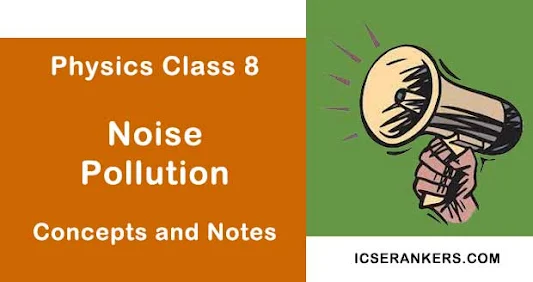Noise Pollution- Physics Guide for Class 8
Information about Noise Pollution
Title | Noise Pollution |
Class | Class 8 |
Subject | Class 8 Physics |
Topics Covered |
|
Noise and Music
We hear different types of sounds around us. There effect on us is, however, different. The 'feeling, or 'effect', associated with a given sound can vary from person to person. A sound which is pleasing for one, may be a disturbing noise for another! However, as a general rule, certain sounds produce a pleasing or soothing effect on us while others can disturb us and cause irritation and unpleasant feelings.
All of us have had the experience of hearing street dogs barking at one another. Trucks, buses and cars may honk their horns at the site of a traffic jam. How do we feel on hearing these sounds? It certainly is not a pleasant feeling!
- We call unpleasant sounds as noise. It turns out that noises are due to sounds produced by irregular or non-periodic vibrations.
- Noise, is derived from the Latin word nausea implying an 'unwanted, unexpected and unpleasant sound'.
- The world of sound is not all that bad. Many sounds are pleasant to the ears and produce a soothing effect on us.
- When we listen to the sounds of Pandit Ravi Shankar playing his 'sitar', or Ustad Bismillah Khan playing his ishennar, or Shri Hariprasad Chaurasia playing on his 'flute', or Lata Mangeshkar singing one of her songs, we feel relaxed and happy. These sounds give us a pleasant and comfortable feeling. We call all such (pleasant) sounds as musical sounds.
- A musical sound (or music) is, thus, a sound which produces a pleasing feeling. It makes us feel happy and comfortable. It turns out that such sounds are produced by regular or periodic vibrations.
Noise Pollution
The disturbance, produced in our environment, by the presence of excessive or undesirable loud sounds of various kinds and forms, is referred to as noise pollution.
Like other pollutants (of air/water) noise, to a large extent, is also a result of industrialisation and modern civilisation.
The problem of noise pollution is not that bad in small towns and villages. However, persons residing in villages or towns, located along a national highway, or close to railway tracks or industries, very often, may also have to bear the brunt of excessive noise.
Sources of Noise Pollution
- Noise is produced by both people and 'the machines. Some of the sources of noise pollution, that we are quite familiar with, are listed below.
- The use of various types of appliances and gadgets in homes, such as mixer, grinder, vacuum cleaner, lawn mower, television set and music system (at high volumes), often creates 'noise' and that too at quite a high level.
- Street noise, traffic noise, public transport, playgrounds, shopping malls and market places, loud speakers in social functions, and so on, quite often cause noise pollution.
- Small factories/large manufacturing units and construction equipments, often cause unpleasant sounds of quite high loudness level. This is because they often use a large number of machines.
- There are also lots of other sources of noise pollution that should not be ignored. Noise, coming from dripping taps, ticking of clocks and coolers, etc., may disturb and irritate us.
Effects of Noise Pollution on Health
It has now been well-established that presence of excessive noise, in the surroundings, can cause many health related problems. The ill effects of noise are many. It may affect the physiology as well as psychology of the affected people.
We list below some of the effects that noise pollution can cause on human health through its continuous effects over large periods of months and/or years.
- The most immediate effect is deterioration of mental health. Continuous noise can create panic. The affected person may become jumpy and her/his frustration level may increase. It may also result in lack of concentration of mind.
- Noise pollution also effects human heart. It may also cause : lack of sleep, hypertension, nervousness, anxiety, decrease in ability to memorise and extreme emotional behaviour.
- Noise pollution may lead to hearing impairment. On short term basis, noise pollution can cause temporary deafness. If the noise pollution continues over a long period of time, the person may get permanent damage in her/his ears.
Measures to Limit Noise Pollution
In this age of technological advancement, it is very difficult to completely eliminate all 'noise'. However, we must do our best to reduce the intensity of noise and thus, help to minimise its harmful effects.
- For this, silencing devices need to be installed in aircraft engines, transport vehicles, industrial machines and home appliances.
- We also need to restrict the use of loud speakers and amplifiers in public places.
- Different industrial units must be set-up far away from residential areas/localities.
- Plantation of trees, along roadsides, also helps in absorbing sound.
- A simple precaution, we all can take, to minimise the harmful effects of noise on our ears, is to 'stay away' from noisy places/locations, as far as possible.
Hearing Impairment
Total hearing impairment, a rare defect, may be there from birth itself.
- Partial disability is generally the result of a disease, injury or age.
- By learning sign languages, such persons can still communicate effectively.




